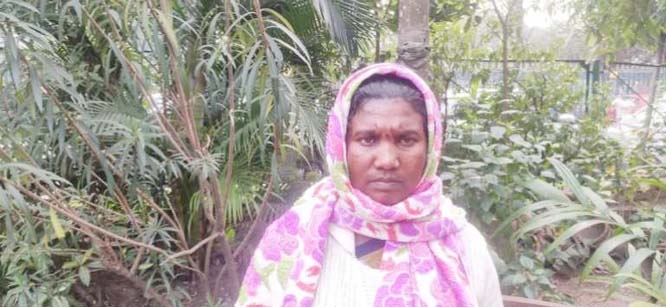
Al Jazeera :
Mainomoti Soren, a 42-year-old farmer in Dewanganj village in eastern India, was one of at least 100 women who clashed with supporters of a political rally in her village over the government’s attempts to buy her land to mine the coal buried there.
As the police beat the protesters with sticks last December, Soren, who was two months pregnant at the time, felt blood oozing down her legs and she fainted. Villagers rushed her on a motorcycle to a hospital but she had already lost the baby.
“I kept pleading about my pregnancy, but they didn’t listen and beat me with a stick,” says Soren. Soren is among the hundreds of women belonging to an Indigenous community who have been leading since September a fierce battle against the West Bengal government’s efforts to set up a coal mine in Birbhum district which is touted to be the second-largest in the world on account of its estimated coal reserves of 2,102 million tonnes.
She is trying to hold on to the 4 acres (1.6 hectares) of land that she owns in Birbhum, about 200km (125 miles) from state capital Kolkata, where she grows paddy and vegetables. She keeps what she needs to feed her family of four, including her husband and their two children, and sells the rest, earning about 5,000 rupees ($66) on average a month. With the income barely enough, her husband works as a daily wage labourer on another farm.
“We find it difficult to eke out our livelihood,” says Soren, adding, “the loss of land will push us further into poverty.”
Villagers complain that no action has been taken against the errant policemen involved in the assault on the protesting women. “We were beaten up in the absence of female police,” Suhagini Soren, another villager who had joined the protests, told Al Jazeera. “They assaulted us severely but no action has been taken yet,” she said, showing four stitches on her hand as a result of the scuffle.
Senior police officers, however, denied any police brutality. “There was a minor scuffle between the two groups when the rally was being taken out in the village. Police intervened and pacified both the factions. But there were no reports of police brutality,” Nagendra Nath Tripathi, Birbhum superintendent of police, told Al Jazeera. The police were investigating the claims of brutality, he added.
Mainomoti Soren is one of the many Indian women resisting a coal mine in her village [Gurvinder Singh/Al Jazeera]
The proposed coal project is spread across 18 villages and covers 4,314 households and about 21,000 people in the Deocha-Panchami-Dewanganj-Harisingha blocks of Birbhum and is commonly known as Deocha-Panchami coal mining project. Locals mostly farm their own land or someone else’s and also work as daily wage labourers in stone quarries and crushers in the area.
In September 2018, the federal government allocated the coal block to the West Bengal government. A year later, the state government handed over the block to West Bengal Power Development Corp Ltd (WBPDCL) for extracting coal and generating power. The government plans to invest 350 million rupees ($4.6m) for power generation.

